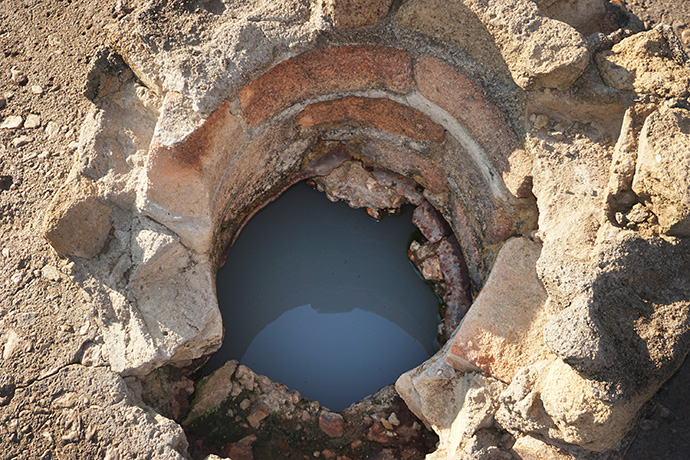Students and staff at two rural schools now have access to clean water thanks to the Chabadza partnership between The United Methodist Church in Norway and Zimbabwe.
Children in developing countries often die as a result of waterborne diseases. In Zimbabwe, children are especially vulnerable. The Mutsago and Mount Dema Schools Piped-Water Reticulation Project is helping to curb the outbreak of waterborne diseases by providing clean water through a piped water network.
The $24,000 project is funded through the Norway-Zimbabwe Community Development Program with support from the local community. The partnership operates on the principal of “chabadza,” which refers to people pitching in to help with someone’s ongoing work.
Before the water project, an average of 50 students per week traveled nine miles to the St. Andrews Clinic for medical attention. Because of the high frequency of students visiting the clinic, the school prepaid a consultation fee so they would receive prompt attention.
“Outbreak of dysentery, typhoid, bilharzia (parasites) and cholera was very common,” said Adja Muzama, a seventh-grader at Mutsago Primary School. “We would miss school.”
Erisha Maseure, headmaster at the school, agreed. “Absenteeism was high,” he said, “but now the rate of children frequenting the clinic or staying at home has reduced drastically because of access to clean drinking water.”
Previously, he said, the “possibility of losing a life was high because children were sharing the same water source (open well) with animals. Since it is open, it was very risky for schoolchildren to fetch water from it.”
It wasn’t unusual for teachers to relocate to safer areas. Memory Maseure is a teacher at Mutsago Primary School and the headmaster’s wife.
She said: “When I was told that there is water reticulation now, instead of asking my husband to join me in Chipinge Town, I had to transfer and join him because I knew my health was safe. I am very happy to unite with my family. Distance separation was a threat to my marriage and costly to travel.”
Along with reducing waterborne diseases, the project blends well with the government’s new school curriculum that encourages practical subjects like agriculture.

Children at Mutsago Primary School in Mutsago, Zimbabwe, were often sick from drinking water from an open well. The United Methodist Church in partnership with Chabadza Norway Community Development Program is helping bring clean, piped water to two schools. Photo by Kudzai Chingwe, UMNS.
“We are now able to venture into livelihood projects like animal and crop husbandry throughout the year,” said Nyasha Chadambuka, a Form 3 student at Mount Dema High School.
“Our knowledge and skills are being sharpened and widened. We were afraid that we (would) be left behind. We thank The United Methodist Church and (Norway Chabadza partnership) for adding value to our school.”
“Through the sales of the produce from the school garden,” Maseure said, “the school managed to renovate classroom blocks and paint some of the buildings. Some of the proceeds paid school fees for 12 pupils who had dropped out of school.”
The Rev. Stanley Hwindingwi, pastor in charge of Mutsago Circuit, is grateful as well. With water piped into his house, he can irrigate five acres of land.
“I normally plant onion and sugar beans for my home consumption and sale,” he said. “(With) money from sales, I managed to supplement the school fees of my children who are at a boarding school. I have also employed two youth to balance my work and generate employment for them.”
The project has increased the church’s visibility, Hwindingwi added. “Actions speak louder than words,” he said. “Some (in the) community are already into irrigated gardens and are enjoying the benefits from clean and abundant water. This will subsequently benefit the church.”
Elton Mupombwa, the traditional leader and custodian of the land where the project is located, complimented the church for bringing unity of purpose to the community. “Before the project,” he recalled, “we hardly interacted as a family unless there was a funeral, but now there are lots of project activities which force us to meet.
“Day in, day out,” he continued, “we are holding meetings and sharing ideas. There is value added to our land, which has been turned into a green belt. Harvests have been increased, despite that we are in drought-prone area. People are staying in harmony because there is plenty of food, frequent interaction and working together as a family.”
The United Methodist Church in Norway and Zimbabwe teamed to form the Chabadza Community Development Program in 2012. One firm principle of the partnership is that the people in the communities, which must have a United Methodist church, decide what projects are needed and provide labor.
Chabadza project coordinator Gelly Miti said that beginning in 2016, she helped lead awareness campaigns to inform the community about their contributions and the importance of sustainability.
“It took us time,” she noted, “to remove donor-dependence syndrome from the beneficiaries, and a lot of awareness strategies were employed.” In time, Miti said, the community became very committed to the project.
A community-appointed committee monitors the project, and each member pays 50 cents per month toward the electricity bill. This approach helps to ensure project sustainability because the community has ownership.
“The beneficiaries are content with the ownership and project sustainability,” Miti said. “The schools are planning to install sprinklers and provide care and support to orphans and vulnerable children with the objective to empower the girl child.”
The Community Development Program recently was awarded five more years of funding from The United Methodist Church in Norway for community development and capacity building.
Chingwe is communications coordinator for the Zimbabwe East Annual Conference.
News media contact: Vicki Brown at (615) 742-5470 or [email protected]. To read more United Methodist news, subscribe to the free Daily or Weekly Digests.
Like what you're reading? Support the ministry of UM News! Your support ensures the latest denominational news, dynamic stories and informative articles will continue to connect our global community. Make a tax-deductible donation at ResourceUMC.org/GiveUMCom.




